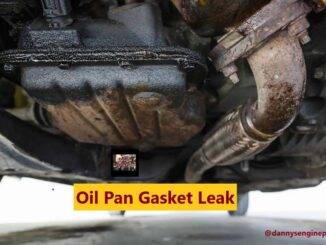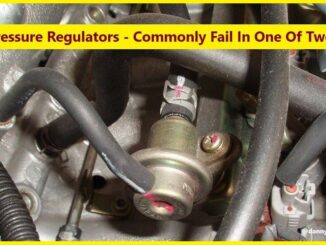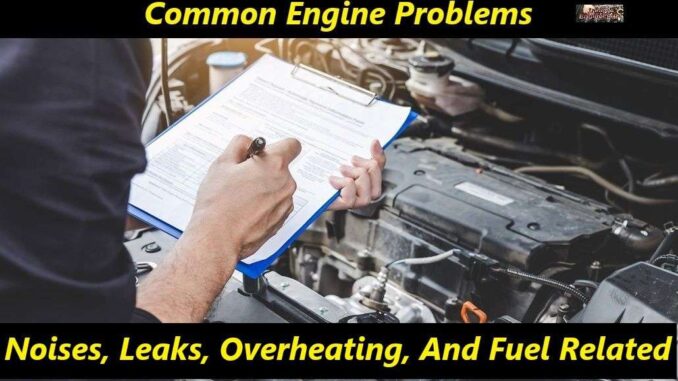
We all know it’s important to take care of your vehicle’s engine. But, there are some common engine problems, that just get overlooked.
So, as a vehicle owner it is important that you’re constantly on the lookout, for symptoms of common engine problems.
As you drive down the road you should be noting, strange noises or other odd issues that may suddenly appear. And, if something ever comes up, take note of the conditions around you when it happened.
But, it never fails, that the most Common Engine Problems, seem to happen at the worst possible time.
That’s why, it’s worth recognizing and considering the signs, that could indicate that not all is well with your engine. To help you spot the signs of common engine problems, we’re taking a look at the signs and symptoms. Consequently, which tell you when, something’s wrong under the hood. From suspicious noises and smoke to other visible signs, also by understanding what to look out for.
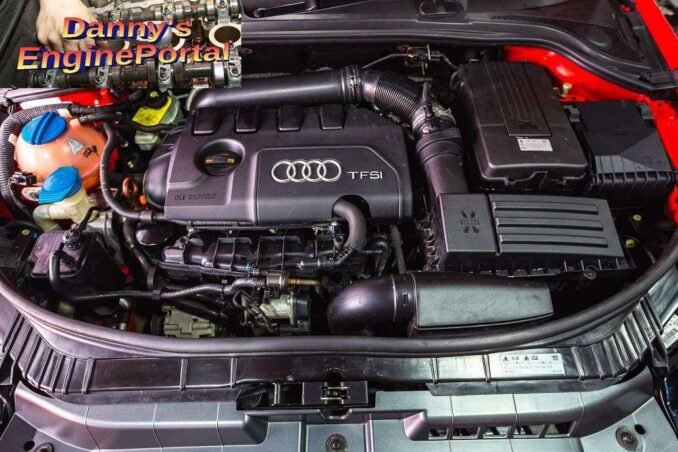
Your engine is a complicated machine, with hundreds of components that need to work together, to make it run properly. It’s important to know that, some of these problems, may have started out as something else. And, this was the end result. Or, that this is the beginning of the problem, that may lead to something even worse.
Common Engine Problems, With Causes And Some Description
Noises, Engine Knocking, Piston Slap, Tapping, Ticking And Rattling Sounds
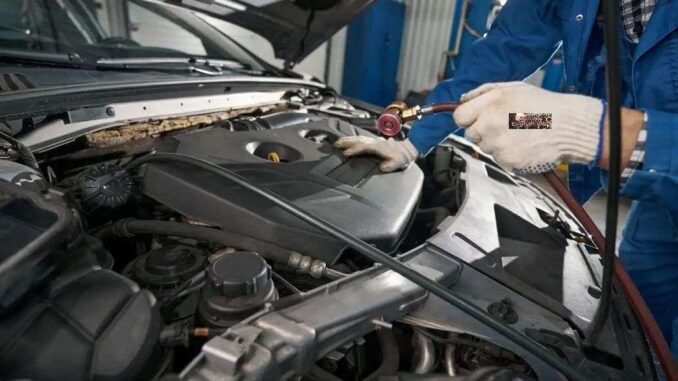
The only sound worse than your engine stopping altogether is “engine knocking”. So, if you’ve ever heard an engine knocking, you’re aware of the pain it causes.
An engine knock sounds like “tick-tick-tick-tick”, which is why some people might also call it “engine ticking”. It’s a noise that you can feel inside the vehicle in many cases. Also, through vibrations in the steering wheel or floor boards. Sometimes, the knocking sound, becomes a light “tapping noise” in the engine. But, goes away when you rev the engine up. But, it comes right back, when you let off the gas. When it gets really bad, the knock is there all the time.
Commonly, the “engine knocking” happens, because of low oil pressure. One way or another, your engine oil isn’t able to properly lubricate, the engine’s internal components.
Aside from the noises, you’re going to notice a couple other problems:
- The engine temperature, is higher than normal.
- Your Check Engine Light (CEL) is on.
Unfortunately, it’s probably too late. Scoring to the engine bearings, has already happened. Damage has already happened to your cylinder walls. And, you’re blowing smoke out your exhaust pipe. In most instances, you’re going to need an engine replacement.
If your car has more than 100,000 miles on it, normal wear is setting in. With that comes some expected repairs, but you don’t want to hear your engine “rattling”. It’s that sound that goes “tap-a-tap-a-tap-a-tap”, and usually comes from the front or top of your engine.
You’re most likely to hear an engine rattle, when your engine is cold. Depending on the problem, the Check Engine Light (CEL) may or may not be on. And, performance will slowly decrease, causing other common engine problems.
Engine “rattling” when accelerating, is a problem with many root causes. And, could be coming from:
- One or more cylinders with worn piston rings. Also, as the pistons wiggle and bang around inside the cylinder, they make a noise called “piston slap”.
- Variable Valve Timing (VVT) system problems, are more common as they age. Mostly because of lack of maintenance.
- Loose or worn timing chains.
- Worn engine valves. Also known as tappets, the valve lifters, may require adjustment. Furthermore, they may have wear on them, causing a space between the lifter, and the valve. Hence, the tapping noise when they touch.
Most, if not all, of the causes of engine “rattling”, require extensive repairs. Without prompt attention, you could find yourself, doubling up on repair costs, or in need of engine replacement.
Leaks, Engine Leaks, Engine Oil Leaks
At every joint in the engine, there’s a gasket or seal. It serves two functions: keeping engine fluids inside, and contaminants outside. The problem is, gaskets aren’t always perfect. And, can cause other, common engine problems.
Gasket construction can take many forms. They could be thin layers of metal like many types of cylinder head gaskets. Possibly cork, like old school valve cover gaskets. They might be rubber, like an O-ring on a cooler hose. It may be just a thin layer of gasket making material like (ATV) sealant.
Any gasket can degrade and fail. For some, like an oil pan gasket, it’s usually just a matter of time, before it seeps or leaks. Others, like the front or rear crankshaft oil seal, just wear over time. Rubber seals and silicone, can deteriorate with time and exposure, and just crack.
No matter what type of seal or how it happens, a leak starts to form. It may be slow at first with an occasional drip from the undercarriage.
An oil leak can be a very minor repair or an extremely involved engine repair. The longer it’s left unattended, the more damage can result. If your engine runs out of oil, you could develop that dreaded engine knock, or even a blown engine.
Engine Overheating
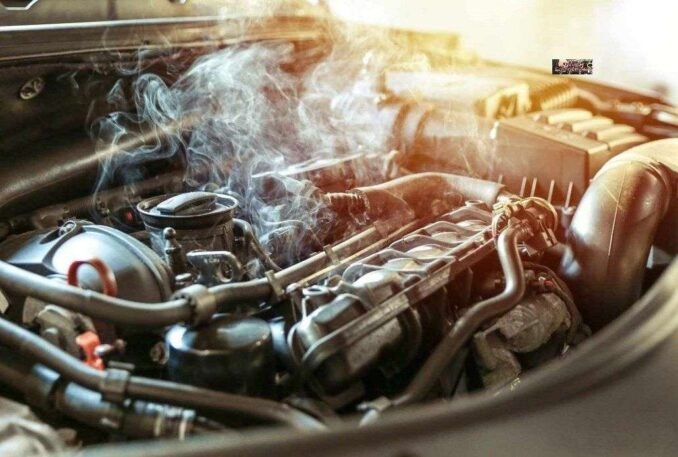
Some common engine problems, are because of external systems. That’s the case for most overheating concerns. Your engine’s cooling system, regulates the engine temperature. And, maintains a precise operating range, for fuel and emissions efficiency. When something goes wrong in the cooling system, your engine temperature can skyrocket.
Any of the following can be the cause:
- Antifreeze leak
- Hole in the radiator
- Failing water pump
- Ruptured cooling system hoses
- Leaking heater core
When temperatures get into the red zone, you have only seconds before permanent damage occurs. Overheating can cause a warped cylinder head, head gasket leaks or a crack in the engine block.
On top of the engine damage your vehicle suffers, you’ll still have cooling system repairs, that need your attention. Otherwise, you’ll repeat the same fate all over again.
Fuel System Issues, Fuel Injectors, Running Rich, Running Lean
You probably didn’t consider fuel system issues, as the cause of engine failure. But, it happens more often than you’d expect. Your engine relies on the precise amount of fuel delivered, at exactly the right time. If too much or too little fuel is injected, severe issues can occur in your engine or exhaust system.
When too much fuel is injected into the combustion chamber, it’s called burning “rich”. The first thing you’ll notice is black smoke from the exhaust pipe, especially when you accelerate.
In essence, this is partially burnt fuel, carried out of your exhaust pipe, goes through the converter. These unburned particles can superheat your catalytic converter. That’s not good, because if your catalytic converter melts down, there’s too much back pressure on your engine. These common engine problems, can cause seals to blow, overheating your engine.
Another nagging issue from too much fuel, is a flooded engine. On startup, excess fuel wets your spark plug tips, preventing them from igniting the fuel/air mixture in the cylinders.
As a result, the Check Engine Light (CEL) will likely be on and your engine will run rough. When not enough fuel is delivered to your engine’s cylinders, it’s called running “lean”. It’s a condition that’s responsible for many engine rebuilds and engine replacements, that should never have been necessary otherwise.
When your engine is running “lean”, it can misfire and run poorly. You’ll experience a lack of power and stumbling. You’ll have engine noise known as “pinging” as a result, but more important is the damage happening inside the engine.
You might be surprised to find that, fuel performs a cooling action inside the cylinder. If there isn’t enough fuel inside each cylinder, it can burn too hot and cause a major malfunction. It can burn out piston rings or exhaust gaskets. It can burn out your spark plugs prematurely. Or if it’s left uncorrected for far too long, it can burn out your piston itself.
Running rich or lean, can be caused by a multitude of conditions. It could be a fuel pump failure or a fuel injector leaking. It could be a plugged fuel filter or contaminated fuel. Whatever the root cause, it needs to be fixed alongside the engine repair or engine replacement you complete.
Conclusion
Although some common engine problems are bigger than others, the vast majority can be avoided. Most often, by regularly taking care of maintenance issues. So, with proper maintenance, you reduce the chances of breaking down and minimize the risk of needing expensive repairs.
BY DANNY BENDER


